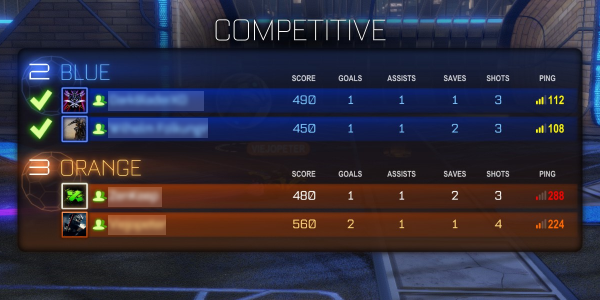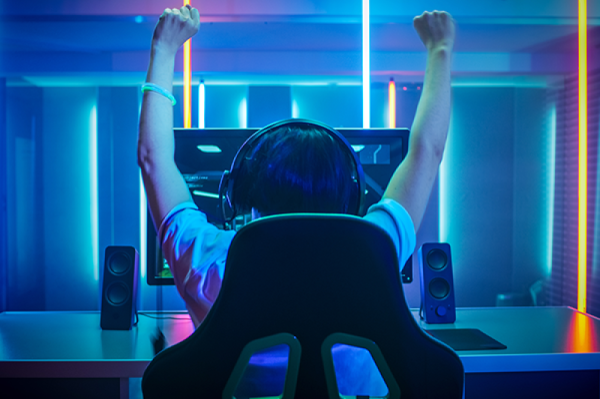There you are, your last kill before that coveted achievement. You line up the perfect shot, you aim, you shoot, and boom, headshot! But, wait, what’s this? Before you can even let out a celebratory whoop, you see your target walking away, taunting you with his intact cranium and un-splattered brains. Or, you’ll be speeding toward the finish line in a close race of Forza, that first place spot so close you can taste the victory. All of a sudden the screen stutters, freezes, and the next second you see your beloved Supra upside down on the side of the track, as that pesky GTO speeding past. What the heck is going on? Most likely, your problem comes from your internet. There are three elements that are determined by your internet that can really affect your gameplay: latency, connection, and speed.
What is latency?
Latency, also known as “ping,” is the time it takes for one console to send a message to another and receive a response in return. A ping rate is one way to measure lag, which is the visible delay between the actions of the player and the reaction of the server. When lag becomes a big problem, it causes the screen to stutter or freeze, which can prevent you from playing altogether. Other times, your connection can drop, disconnecting you from the game completely, causing frustration and sometimes penalties for quitting games early. A ping of 15-20ms is ideal for most games, while the maximum allowable ping rate is 150ms.
An example of a ping problem in play:
What internet connection is best for gaming?
One factor that determines how much latency to expect is your internet connection. The game you’re playing usually shows your connection status and ping rate in your settings. Some games will show you your ping rate at the end of a game on the scoreboard.

Is fiber internet good for gaming?
The best connection for online gaming is fiber. Fiber is generally the fastest and can transfer information at hyper-fast speeds. There are a couple of things that make fiber a reliable type of internet. Unlike cable and DSL, fiber customers don’t have to share bandwidth with their neighbors. That means your game won’t lag just because all of your neighbors are home trying to stream Netflix at the same time. Fiber connections also tend to have symmetrical download and upload speeds. Some of the best fiber plans out there can get you a ping under 20ms, which is optimal for dominating the competition.
Some of the best fiber providers for gaming out there are AT&T, Frontier, and MetroNet. AT&T has one of the fastest-growing coverage areas for fiber internet in major metropolitan areas. Frontier offers affordable fiber internet with symmetrical speeds. And MetroNet is bringing fair fiber internet prices to the Midwest.
Is cable internet good for gaming?
Cable is the second-best option for online gaming. It’s widely available with speeds up to 1 Gbps. While speeds can reach up to 1 Gig, a cable connection uses a shared connection. A shared cable connection means you might experience slower internet speeds in the evening when your neighbors are online at the same time. Expect your cable internet ping to range from 20-50ms based on your plan’s download speed.
Spectrum, Xfinity, and Cox are some of the best cable internet providers for gaming. All three providers offer gigabit internet in select areas. We recommend Spectrum if you want a no-contract provider that offers faster starting speeds than the competition.
Is DSL internet good for gaming?
A DSL internet connection is good enough for gaming, but it might boil down to each internet service provider. It's only decent if you are physically close to the provider and have a decent package of at least 12 Mbps or more. The signal for DSL is sent through copper phone lines, and quality decreases over distance. So if you happen to be too far from the signal's source, you could experience intermittent dropouts and increased latency. Your ping with a DSL Internet connection will linger around 100-300ms. If a cable or fiber provider is offering internet at similar prices, you’ll want to go with one of those since they are not tied to these limitations.
Is fixed wireless good for gaming?
Online gaming on a fixed wireless connection is possible, but it can range from good to awful. The connection’s performance depends on many factors, such as the weather, how far you are away from the tower, and how many fixed wireless subscribers are using the connection at the same time.
Fixed wireless uses a central tower to send and receive signals to your home. If too many users on a fixed wireless connection, even your neighbor, are attempting to communicate with the tower, it can cause lag and slower speeds.
Data caps are one thing to watch out for if you're able to game on a fixed wireless connection.
Is satellite internet good for gaming?
Satellite is not good for gaming. Lag is very high on a satellite connection, so your team might be waiting for your character to respawn before you even realize your character has been shot. Even if you take the risk of trying to compete on a satellite connection, most satellite internet plans come with a smaller data allowance. Streaming on Twitch and securing your enemy's base can really eat through your data limit.
How much speed do I need for gaming?
While faster is always better, download and upload speeds don't necessarily impact your gaming in a huge way. Some gamers suggest that upload speed matters, but isn't essential unless you are hosting a game, and the average gamer isn't hosting — he or she is most likely connecting to a dedicated server that handles the brunt of the work. The recommended minimum for online gaming is a download speed of at least 5-12 Mbps and an upload speed of at least 1-3 Mbps for each gamer in the house.
Twitch:
Internet speed will come into play if you’re trying to livestream your skills on Twitch. Given that you have the proper hardware, the minimum upload speed needed to livestream is:
- 5 Mbps for 720p resolution
- 10 Mbps for 1080p resolution
Aim for higher upload speeds than this if you don’t want it to slow your internet down from doing other things at the same time.
If you do happen to have limited internet speeds available, such as only having access to 12 Mbps for multiplayer gaming, here are some tips:
- Don't stream Netflix, Hulu, Amazon Prime TV, YouTube, Twitch or any other video service while playing - this will use up some of your bandwidth (available internet speed).
- Connect directly to your router using a network cable, not wirelessly. Using a wired connection with a better ethernet cable like CAT5/6/7/8/over 9000 will always be faster and more reliable than a wireless connection.
- If you are on a PC or Mac, as opposed to a console like Xbox or PS4, close all your open programs that aren't required to run your game - you don't want other programs using internet connection.
- Ask other people in your household to hold off on tirelessly scrolling through Instagram, Facebook, or watching videos until you have finished gaming. Anyone else sharing your internet connection will use up some of your speed.
Does online gaming use a lot of data?
Not every internet service provider comes with unlimited data. Even providers like AT&T cap popular internet plans at 1 TB of data.
Online gaming
Playing just 1 hour of the newest games will use much less data than streaming 1 hour of Netflix in 4K. Still, data from playing games all day can add up.
To give you an idea of how much data online gaming takes, we’ve broken data usage down by game:
| Game | Data Usage |
|---|---|
Call of Duty: Black Ops 4 | 40 MB/hr |
Fallout 76 | 60 MB/hr |
Fortnite | 45-100 MB/hr |
League of Legends | 30-200 MB/hr |
World of Warcraft Raids 30v30 standoffs |
25 MB/hr 160 MB/hr |
Hosting
In online gaming, you will generally encounter two different methods that games use to connect you with other players, these are:
- Dedicated servers: a separate computer server running its own instance of the game that is used as the authoritative source of events in a multiplayer match. They are most common in PC gaming, but games like the "Battlefield" series make use of them for its Playstation and Xbox versions.
- Peer-to-peer connections: uses no server, instead of connecting players directly to other peers, making each console responsible for processing the raw data received from other consoles.
In games that use peer-to-peer hosting, the player that is hosting uses a lot more data than other players. The host’s connection is responsible for all data sent and received during the game.
Downloads
Games are extremely data hungry when it comes to downloads. If you buy a digital copy of a game, you’ll need to download the game itself. Downloading the full game of Star Wars Battlefront takes 27GB of data to start playing. That doesn’t include patches to update the game, which depending on the game can use a few MB to dozens of GB per patch. One of Fallout 76’s latest patch was over 47GB in size.
A bad connection can cause serious problems
To better avoid encountering connection problems and hurting your online console gaming experience, it's important to understand what causes them in the first place. Other than the occasional glitch or hardware problem, lag or dropped connections are usually the result of the player’s Internet connection. Here are a few ways your connection could be slowing down your gameplay:
- Proximity problems: The further away a player is from a server, the longer it takes for data to be relayed, raising (slowing) their latency. Depending on server rules, a high ping will sometimes bar a player from entering a game, since just one player with high ping can cause latency issues for everyone else.
- Improperly configured router: Many routers, especially older models, block certain types of connections for security purposes, sometimes preventing you from connecting to certain servers. Also, university and college networks are usually set to block gaming connections, so if you are gaming out of your dorm, you may want to check.
- Overused bandwidth: When too many people are using your home’s Internet connection at once, taking up all the bandwidth, your connection can slow severely, causing major lag.
Solutions
1. Test Your Connection The first step in solving your connection issues is to get an idea of just how fast your internet is performing. There are a few different resources for testing the speed of your connection, but one of the most popular is speedtest.net, a tool made by web analytics company Ookla. Speedtest.net lets you know your download and upload speeds, as well as your ping in relation to different servers around the world (click around on the map to select different servers). Once you know what your connection is capable of, you can determine if there are problems with the settings on your router, or whether your ISP is delivering speeds close to what they advertised.
2. Pick Your Connections Often, avoiding lag is as simple as picking the right servers. When browsing for games, pay attention to the quality of connection displayed for the servers or the other players, especially if you can view the actual numerical measurement for the ping (stick to servers with ping below 100ms as much as possible). If you can't find an indicator of ping, try to pick servers or matchmaking regions close to where you live. A game hosted in another country will be slow, but one located in the next state over will give you a better experience.
3. Configure your router The most common solution to connection problems is to set up port forwarding in your router menu. You'll have to consult the manual on how to access that feature for your particular brand of router, but once you get into the menu, you can follow instructions from both Microsoft and Sony to configure your settings for each console. Sometimes lag and connection issues are unavoidable, due to problems with Xbox Live or Playstation Network, high traffic during peak hours, or just one of those mysterious glitches. Being persistent, especially when dealing with a fickle matchmaking system can eventually lead you to that perfect game.


